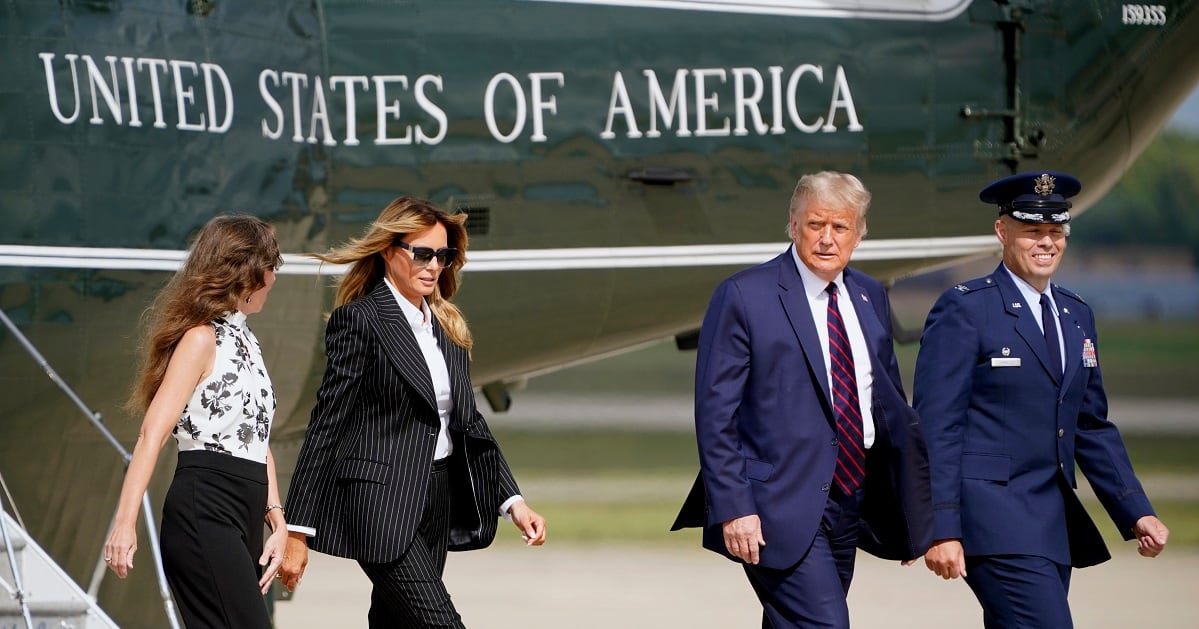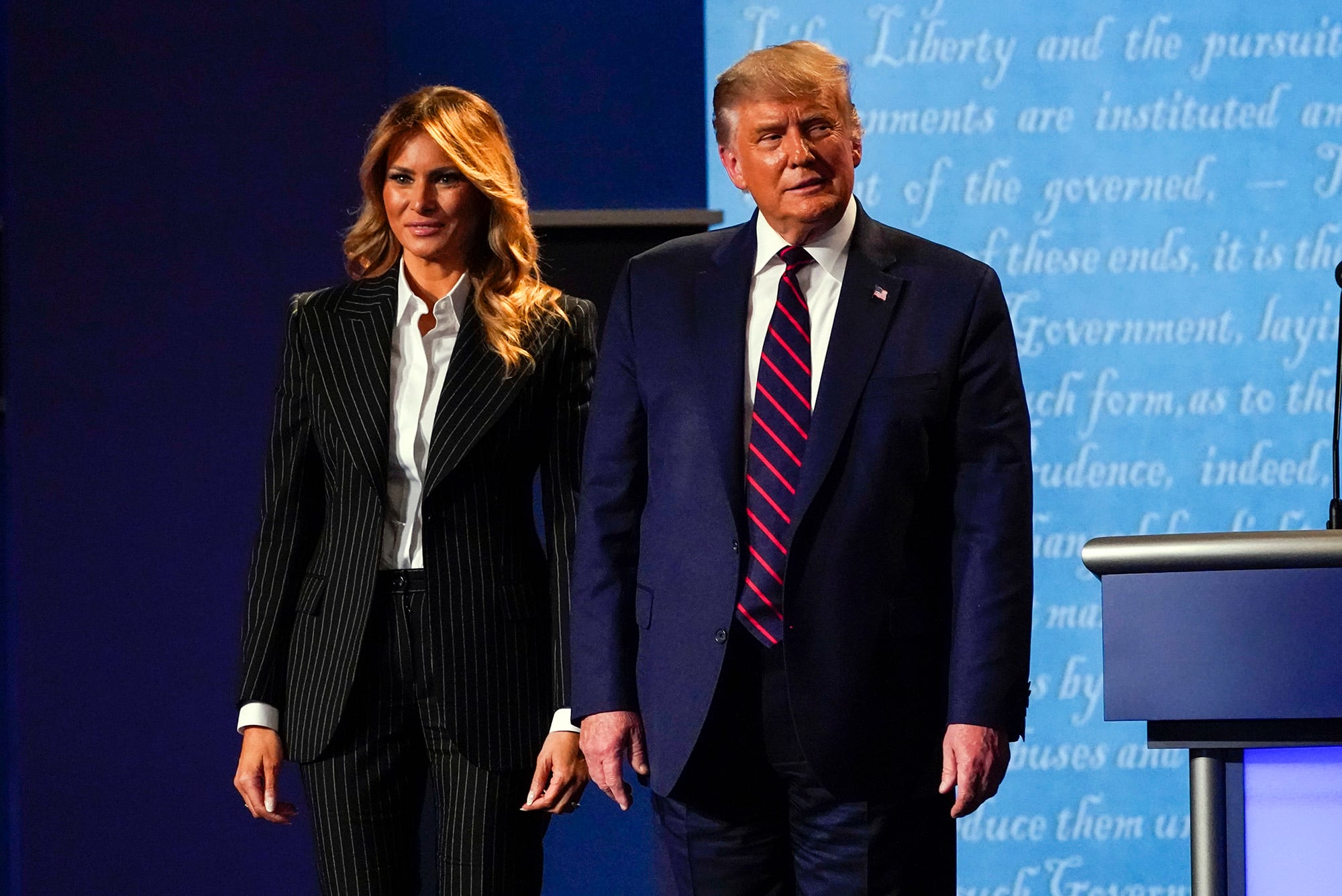President Donald Trump will spend a “few days” at a military hospital after contracting COVID-19, the White House said Friday.
Trump left the White House by military helicopter for Walter Reed National Military Medical Center Friday afternoon. A White House official said the visit was precautionary and that Trump would work from the hospital’s presidential suite, which is equipped to allow him to continue his official duties.
Earlier Friday, the White House said Trump, who is 74, remains “fatigued” and had been injected with an experimental antibody cocktail for the virus. COVID-19 has killed more than 205,000 Americans in the past seven months.
“President Trump remains in good spirts, has mild symptoms, and has been working throughout the day," said Trump’s press secretary Kayleigh McEnany, according to a White House press pool report. "Out of an abundance of caution, and at the recommendation of his physician and medical experts, the President will be working from the presidential offices at Walter Reed for the next few days. President Trump appreciates the outpouring of support for both he and the First Lady.”
Physicians at Walter Reed typically handle medical appointments and other responsibilities for the president and other government leaders. White House officials emphasized that there has been no decision to have Trump step aside from any of his normal duties and have Vice President Mike Pence assume executive branch authority.
The president’s physician said in a memo late Friday that Trump received a dose of an experimental antibody cocktail by Regeneron that is in clinical trials. Navy Cmdr. Dr. Sean Conley said Trump “remains fatigued but in good spirits” and that a team of experts was evaluating both the president and first lady in regard to next steps.
First lady Melania Trump, who is 50, has a “mild cough and headache,” Conley reported, and the remainder of the first family, including the Trumps' son Barron, who lives at the White House, tested negative.
RELATED

Military officials Friday morning downplayed worries after Trump announced overnight that he had tested positive for coronavirus. At the time, it was said that Trump would be forced into medical quarantine for an undetermined period of time.
In a statement, the Joint Chiefs of Staff said they have not made any adjustments to force posture or operations as a result of the president’s diagnosis. Trump tweeted just after midnight on Friday that both he and the first lady had tested positive and would begin their “recovery process” immediately.
“There’s been no change to our alert levels,” the statement said. “The U.S. military stands ready to defend our country and its citizens. There’s no change to the readiness or capability of our armed forces.”

Pentagon spokesman Jonathan Hoffman said Friday morning that “the U.S. military stands ready to defend our country and interests. There’s no change to the readiness or capability of our armed forces. Our national command and control structure is in no way affected by this announcement.”
On Friday afternoon, after news of Trump’s transfer to Walter Reed, he said the president’s hospitalization would not change the Pentagon’s readiness or alert status.
Defense Secretary Mark Esper, who is currently on an official visit to Morrocco, last saw Trump on Sunday at a Gold Star families event also attended by Army Gen. Mark Milley, chairman of the Joint Chiefs of Staff, Hoffman said.
“In preparation for and as part of his international travel, Secretary Esper tested negative for COVID on Monday and Wednesday of this week,” Hoffman said. “Today he will be tested again as planned for continuation of his travel. He will not be returning to the U.S. early. The chairman was tested this morning and was negative.”
Air Force Secretary Barbara Barrett and Chief of Staff Gen. Charles “CQ” Brown, as well as Chief of Space Operations Gen. Jay Raymond also attended the event for Gold Star families, said Air Force spokeswoman Lt. Col. Malinda Singleton on Friday. All have tested negative for coronavirus twice over the past week, including before the event and as recently as Friday, and have exhibited no COVID symptoms.
The Gold Star Families event also is where Marine Corps Commandant Gen. David Berger last interacted with the president. Berger has tested negative “several times” during the past week, Maj. Eric Flanagan, a spokesman for the commandant, told Marine Corps Times in a Friday email.
Marines supporting the president as part of Marine Corps Helicopter Squadron One will be tested for COVID-19, and following the Centers for Disease Control and Prevention guidance will go into quarantine while awaiting the results, a Marine Corps official confirmed.
The Marines from Marine Corps Helicopter Squadron One, also known as HMX-1, are tasked with providing helicopter transport to the president and vice president, inevitably putting them in close contact with the president.
“HMX-1′s top priority is mission readiness and the health of its passengers and personnel,” Capt. Joseph Butterfield, a spokesman for Headquarters Marine Corps, said in a Friday email.
Retired Army Gen. Joseph Votel, who commanded both U.S. Central Command and U.S. Special Operations Command, told Military Times that no changes in how the military operates in this situation are likely.
“There is a well established chain of command that goes through the SECDEF,” he wrote in an email. “The Constitution provides for continuity in the case that the President is incapacitated — which it appears is not the situation at this point. I can’t imagine anything in particular is going on in this regard (contingency planning) — our military leadership is very resilient as is our national security decision making process.”
Retired Army Maj. Gen. Mike Jones, who served as U.S. Central Command chief of staff in 2011 under then-commander James Mattis, told Military Times it is unlikely anything will change at the combatant command level.
“Beyond being ever vigilant that a potential enemy could miscalculate and do something stupid, which is part of every day life, I doubt the COCOMs do anything special,” Jones said. “The vice president stays well informed on national security issues and is prepared to take over for an incapacitated president. So I doubt much special is going on at CENTCOM. The only issue is when incapacitation is official and when the “football” (nuclear codes) go to the VP, but there are procedures for that and CENTCOM isn’t involved.”
RELATED

Earlier on Thursday, Trump announced that one of his senior advisers, Hope Hicks, had tested positive for the illness, which has killed more than 200,000 Americans over the last seven months and more than 1 million individuals worldwide.
In a Fox News appearance Thursday night, Trump suggested that Hicks may have contracted the illness from a member of the military during a recent campaign stop.
“It’s very, very hard when you are with people from the military or law enforcement, and they come over to you, and they want to hug and want to kiss you because we really have done a good job for them,” he said. “You get close and things happen.”
Trump has not held any official rallies or meetings at military bases in recent weeks, but has traveled through Joint Base Andrews, Md., nearly every day this week en route to other events around the country.
Jordyn Phelps, ABC News White House reporter, traveled with the president aboard Air Force One Thursday, the day before he announced he was sick. She wrote about what she saw on the plane:
“Onboard, the traveling press corps were the only ones wearing masks," she wrote. "No members of the president’s staff, the Secret Service, or members of the fight crew wore one.”
Officials with the Air Force’s 89th Airlift Wing, which flies the president round the world, refused to directly answer a question about whether aircrew members who were aboard the aircraft this week are now in quarantine.
“The 89th Airlift Wing has established safety procedures for day-to-day operations incorporating Center for Disease Control’s (CDC) public health guidance and frequent COVID-19 testing of the Air Force One flight crew members,” according to a statement from the 89th’s public affairs office. “In the event any Air Force One personnel are exposed, become symptomatic, or test positive, the 89th Airlift Wing would follow the guidelines established by the CDC."
Of course, one of the events Trump attended was Tuesday’s presidential debate in Ohio, where the president, members of his family and a number of campaign staff members (including Hicks) were present.
RELATED

It is not clear whether any of the group were symptomatic or exhibiting signs of illness at that time. White House pool reporters attending that event said that most members of the president’s entourage refused to wear a mask at the indoor event, while most of the family and staff accompanying former Vice President Joe Biden did.
It is not clear whether any of the group were symptomatic or exhibiting signs of illness at that time. White House pool reporters attending that event said that most members of the president’s entourage refused to wear a mask at the indoor event, while most of the family and staff accompanying former Vice President Joe Biden did.
During the debate, Trump pushed back on accusations he had not taken enough personal precautions to avoid the fast-spreading virus.
“I think masks are okay,” he said. “I put a mask on when I think I need it. Tonight, as an example, everybody’s had a test and you’ve had social distancing and all of the things that you have to. But I wear masks.”
Staff for Vice President Mike Pence said Friday morning that he has not tested positive for coronavirus, and “remains in good health.” White House officials did not immediately outline what new responsibilities he may take on while the president is in recovery.
This story contains information from the Associated Press. Reporters Meghann Myers, Philip Athey and Military Times managing editor Howard Altman contributed to this story.
This is a developing story. Please stay with Military Times for updates.
Leo covers Congress, Veterans Affairs and the White House for Military Times. He has covered Washington, D.C. since 2004, focusing on military personnel and veterans policies. His work has earned numerous honors, including a 2009 Polk award, a 2010 National Headliner Award, the IAVA Leadership in Journalism award and the VFW News Media award.




